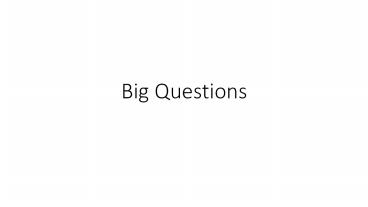Big Questions - PowerPoint PPT Presentation
1 / 6
Title:
Big Questions
Description:
... Asia and Africa and Americas Catherine de' Medici killed Protestants Henry IV was a good king who tolerated Protestants witch hunts Spain had Civil War ... – PowerPoint PPT presentation
Number of Views:36
Avg rating:3.0/5.0
Title: Big Questions
1
Big Questions
2
Big Question 1 What were the central ideas of
the reformers, and why were they appealing to
different social groups?
- Basic beliefs and ideas
- Jesus, not the Pope is the head of the church.
Faith alone is enough to earn salvation. The
Clergy could be married. There is no purgatory or
saint worship. - Why they were so appealing
- It was a simple religion. Clergy is no longer tax
exempt. People directed church service. The
printing press allowed the Bible to be translated
and sent out to the masses vernacular.
3
Big Question 2How did the political situation
in Germany shape the course of the Reformation?
- The rise of the Habsburg dynasty included
strategic marriages that lead to strong political
alliances. Kept them in power. - Charles V was a Habsburg who had one goal which
was to maintain religious unity. - Conflicts over land borders and religion
- People fought over the fact that rulers
determined religion this lead to a treaty in
which, cantons choose religion - Diet of Augsburg ordered Protestants to convert.
- Peace of Augsburg population must convert or
leave and officially recognized Lutheranism
4
Big Question 3How did the Protestant ideas and
institutions spread beyond German speaking lands?
- Henry the 8th divorced
- Clergy studied under Luther took it to the
Netherlands - Secular rulers changed to take catholic lands
- Examples made by reformers, such as Calvin in
Geneva - Weak political authority in Scotland
- Literature and the printing press
5
Big Question 4How did the Catholic Church
respond to the new religious situation?
- they had a Catholic reform
- educated clergy, eliminate corruption, stop
indulgences, executed and imprisoned people
accused of heretics, Index of Forbidden Books - no compromise with Protestants Bishops live in
diocese - expanded missionaries
- Jesuits spread Catholicism to Asia and Africa and
Americas - Catherine de' Medici killed Protestants
- Henry IV was a good king who tolerated
Protestants - witch hunts Spain had Civil War
6
Big Question 5 What were the causes and
consequences of religious violence, including
riots, wars, and witch-hunts?
- RIOTSCaused by the St. Bartholomew Day Massacre
of protestants. - Consequently, Politiques wanted a strong
monarchy, naming Henry IV as King. Also got the
Edict of Nantes passed which made French
Calvinists permitted but Catholicism official. - WARSCaused by the spread of Calvinism into the
Netherlands, which preached that people should
rebel against an ungodly government. Caused by
civil war between Catholics and Protestants. - Consequently, the Union of Utrecht was passed,
dividing the Netherlands into a Protestant North
and a Catholic South. - WITCH HUNTSCaused by religious paranoia, but
used for personal gains. - Consequently, 40,000-60,000 people were executed.































